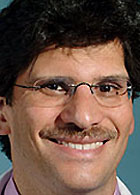Patients managing diabetes can now get full diagnostics, treatment and education in one place — the Washington University Diabetes Center at Barnes-Jewish Hospital.
The Diabetes Center, on the 13th floor of the Center for Advanced Medicine, will provide a new group-care and patient-education approach for patients with type 1 or type 2 diabetes, said Garry Tobin, M.D., associate professor of medicine and medical director of the center. In addition, long-time and newly diagnosed patients will have access to the latest technology, treatments and clinical research. Through individualized instruction and small-group sessions on topics including nutritional counseling, carbohydrate counting, insulin self-management and insulin pumps, patients will learn how to maintain better control of their blood sugar levels.

Patients with diabetes can get an annual “tune up,” which includes a retinal scan, lab work, blood pressure check, urinalysis, foot exam and a self-management assessment. Patients will receive a summary of the results and a tailored care plan.
Along with Tobin, the staff will include American Diabetes Association-certified nurse educators, registered dietitians, advanced-practice-ADA-certified nurses, a clinical nurse manager and support staff as well as other physician members of the Diabetes Center.
“The Diabetes Center is a way for primary-care physicians and their patients to get support from endocrinologists and other allied health specialists in diabetes treatment,” Tobin said. “Patients can seek services from an institution recognized as a national leader in the area and from specialists who can manage complex cases or complications as a team with their referring physician.”
The center’s staff is developing and implementing inpatient protocols for newly diagnosed or long-term patients with diabetes to help get or maintain diabetes control when admitted to Barnes-Jewish.
“We’ve tapped into the brainpower of a panel of medical advisers representing the power and skills of both the University and Barnes-Jewish Hospital to develop these inpatient protocols,” Tobin said. “The support of the dedicated and terrific nursing staff has made this process a success for the center as well as for patient care.”
The St. Louis area has one of the highest rates of diabetes in the nation, and one-quarter of patients admitted to Barnes-Jewish Hospital have a diabetes-related diagnosis, Tobin said. Nationally, 20.8 million children and adults in the United States, or 7 percent of the population, have diabetes, although nearly one-third don’t know that they have it.
For more information or to make an appointment, call 867-3627 (TOP-DOCS).
Center offers patients latest treatments
The Washington University Diabetes Center at Barnes-Jewish Hospital focuses on providing patients with the latest technology, treatments and clinical research. Some patients at the center are receiving a new diabetes drug that may have a welcome side effect — weight loss.
Byetta, developed by Amylin Pharmaceuticals and Eli Lilly and Co., is designed to help patients with type 2 diabetes get better control of their condition by helping the body make more of its own insulin. The drug, a twice-daily injection, tells the pancreas to make the right amount of insulin after meals to bring blood sugar closer to normal levels. It also helps stop the liver from producing too much sugar when the body doesn’t need it and helps slow down the rate at which sugar enters the bloodstream. It is typically used along with oral diabetes medications, and in some patients, it has led to weight loss.
One of the patients taking Byetta is Cris Welling, a research lab supervisor in the endocrinology/metabolism lab of M. Alan Permutt, M.D., professor of medicine and of cell biology and physiology. About five years ago, Welling volunteered to be a non-diabetic control in a University research study. When she went through the initial tests, she found out she had pre-diabetes.
Welling’s physician, Garry Tobin, M.D., associate professor of medicine and medical director of the Diabetes Center, had prescribed several other oral medications to treat her diabetes, but none helped her to lose weight. Since she began taking Byetta for type 2 diabetes about 10 months ago, she has lost about 40 pounds. She no longer needs medication for high blood pressure and has reduced the medication she takes for high cholesterol.
Tobin said Welling is a success story.
“Because of her participation in research at the School of Medicine, she was diagnosed at an early stage,” Tobin said. “She has access to the clinical care of multiple people at the School of Medicine, which gives her access to newer drugs.”
Byetta is not approved as a weight-loss drug, Tobin said, because it works to regulate blood sugar. People who do not have diabetes and take the drug could suffer from hypoglycemia, or dangerously low blood sugar.